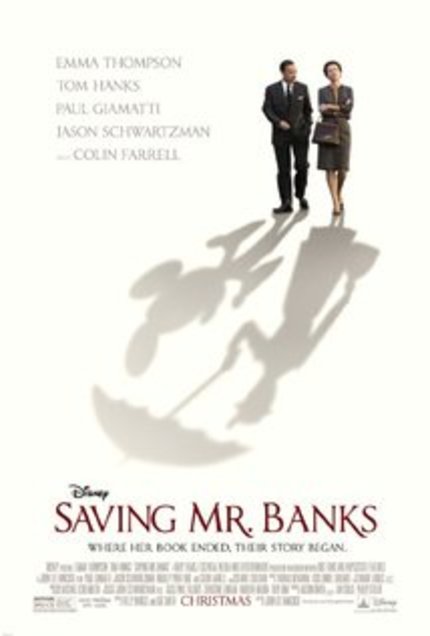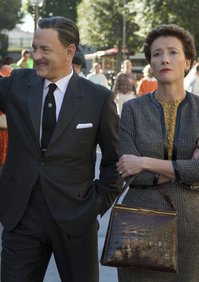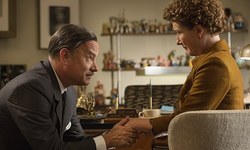Review: SAVING MR. BANKS Banks on "Mary Poppins" Goodwill

But, while that is indubitably not the proper verdict, this "true history" of Walt Disney's late-in-life completion to his long running struggle to make the classic film Mary Poppins is not quite the jolly holiday it sets out to be, either. It is, nonetheless, something to stay awake for. Saving Mr. Banks is an enjoyable and well-crafted historical fiction that's biggest enemy isn't its sugarcoating of true events (of which its director John Lee Hancock, known for The Blind Side and The Alamo, is no stranger), but rather its own hang-ups on uncovering harsh truths in its own past. So is it worth getting hung up over?


Although the film's ubiquitous advertising plays up Tom Hanks as Walt Disney, Mr. Banks, set in the mid 1960s shortly before Poppins finally went into production, is actually a story belonging to the author of the source material, P.L. Travers, played assuredly by Emma Thompson in one of the year's best performances. Likewise, Hanks' Disney is no doubt one of the years best supporting performances, even if this is a somewhat softened version of Walt the man.
It's likely that no film could truly capture what we now know to be the multi-faceted and many reported faces of this very complex and integral man. Thompson's Travers, who spends the film flashing back to her sun-drenched childhood in Australia reliving the travails of her troubled father (Colin Farrell) in-between her present-day losing fight against Mr. Disney for her vision of the integrity of her creation, details her as someone who is equally complex. And therefore she, of course, must be sorted out.
It's almost ironic, then, that Hanks is essentially playing Disney as "Uncle Walt," the congenial public face of what was by then a studio deeply entrenched within a certain saccharine public image, hosting "The Wonderful World of Disney" television show, and whatnot. This is the lovable Walt with a twinkle in his eye, even if the real Walt would at times violently disdain such depictions.
But as another classic children's story recently co-opted by his now-empire once pleaded, pay no attention to the man behind the curtain! (Read Neal Gabler's exhaustive and level-headed biography "Walt Disney: Triumph of the American Imagination" for that.) Saving Mr. Banks isn't about telling the real story. Rather, it's a film about showing how movies, in all their artifice and showmanship, can ultimately "save" us. In the rapidly expanding field of prestige films of that message - recent Best Picture winners include Argo and The Artist - this isn't a bad one by any means, even if it does fall somewhat short of those two examples.

For anti-Disney cynics, which the corporation has earned en masse, Saving Mr. Banks is an easy target. This is, after all, Disney (the company) protectively co-opting a story that is only partially theirs to tell (the other part - arguably the greater part - belonging to P.L. Travers, the creator and author of the beloved Poppins character). Mr. Banks earnestly tells of how 20 years ago, Walt had promised his now-grown daughters that he'd make their favorite book "Mary Poppins" into a movie, and doggonit if he's ever going to let that promise slide. Along the way, actual events are lightened, finagled, and transformed to ever-so-slightly repaint the animation cell history in Disney's legacy-protecting favor. (But honestly, why would we expect any different?)
But the thing about it is, the flip-side viewpoint demonstrates that when it comes to Walt Disney's own pet projects, quality is always tops. And that goes a long, long way in justifying the company's ardent maintenance and defense of his legacy. Also, it should be said that by this point in his life, his personal passion for filmmaking was left behind several stations ago, as his attention had almost fully shifted to trains and theme parks. Making Mary Poppins was his lone holdout for moviemaking he truly cared about, and now, all these years later, it is universally adored as one of the single greatest films of its type in terms of technical bravado and large scale gee-whiz entertainment.
Since then, Disney the company has earned and capitalized on his reputation for high-end technical quality and crowd-pleasing storytelling, racking up generations of ardent fans, unquestioning admirers, and above all, happy repeat patrons. Being a fan of Disney's best efforts is far from wrong, but blindly following any such behemoth corporation in any direction it dictates is just as shortsighted as cynical outward dismissal. Saving Mr. Banks, while never letting go of its home turf advantage, honestly understands and even amusingly addresses the outsiders' disdain for the Disney image and reputation. More than one memorable moment stems from the company's latent insistence on forced happiness.

While the film does unquestionably present Mary Poppins' history through rose colored glasses, its acknowledgement of even mild imperfections in its own historical perceptions is a big step for the notoriously self-protective Disney company. (Though policy dictates that Walt can't be seen as the heavy smoker he was, he is seen putting out a cigarette. It's the small things...) It's true that the film slyly casts sympathy on the side of Disney, yet Travers is truly the main character, and in fact dominates the running time. In her advancing age, she is an unyielding and staunch recluse of a woman, convinced that if she allows Disney to have his way with Poppins, he'll turn her into a singing cartoon.
The film sidesteps the harshness of the reality that it is Travers' financial suffering that has finally brought her around to at long last saying yes to him, and also the fact that while the final resulting film they work together to make doesn't turn Mary into a cartoon, she is certainly surrounded by them. And yes, she of course sings. (The film's best parts detail the Sherman brothers' frustrating efforts to both please the unpleasable Travers and compose the wonderful songs that they are now famous for.)
Make no mistake, Disney will make Poppins his way. His velvet steamroller maneuvering to get what he wants is present, but is downplayed to the degree that no viewer of Mr. Banks could feel good about accusing him of the kind of underhanded manipulation that's clearly going on. After all, we have the benefit of history; who doesn't want to see Disney's Mary Poppins get made? And so, the deck is stacked thusly.
The endgame goal of Saving Mr. Banks is to bring Travers around to see that the joy and wonder and singing and cartoons of Disney's Poppins is indeed right, and maybe, just maybe, can crack Travers' own sad, torrid exterior. It's telling that the film flies highest during the "sugarcoated" scenes at the Disney offices, and falters to a grinding halt when it bores down and gets "real" in the umpteen Australian flashbacks.
One can -- and in the future, many no doubt will -- view Saving Mr. Banks in the negative, but in the greater scheme of even just Disney itself, there are far more egregious examples worth burning in effigy. For me, as a lifelong pro-Disney filmgoer who also maintains a skeptical eye on their continuous corporate maneuvering, this film isn't the euphoric backstory that I hoped would send me soaring, but it also isn't something to feed the birds with.
Hopefully I've cleared the air so that you don't have to. So cast your carpetbaggage aside, and leave your magic umbrella in the lobby, and go enjoy Disney's Saving Mr. Banks for all it sets out to be.
Saving Mr. Banks
Director(s)
- John Lee Hancock
Writer(s)
- Kelly Marcel
- Sue Smith
Cast
- Emma Thompson
- Tom Hanks
- Annie Rose Buckley
- Colin Farrell

Do you feel this content is inappropriate or infringes upon your rights? Click here to report it, or see our DMCA policy.






